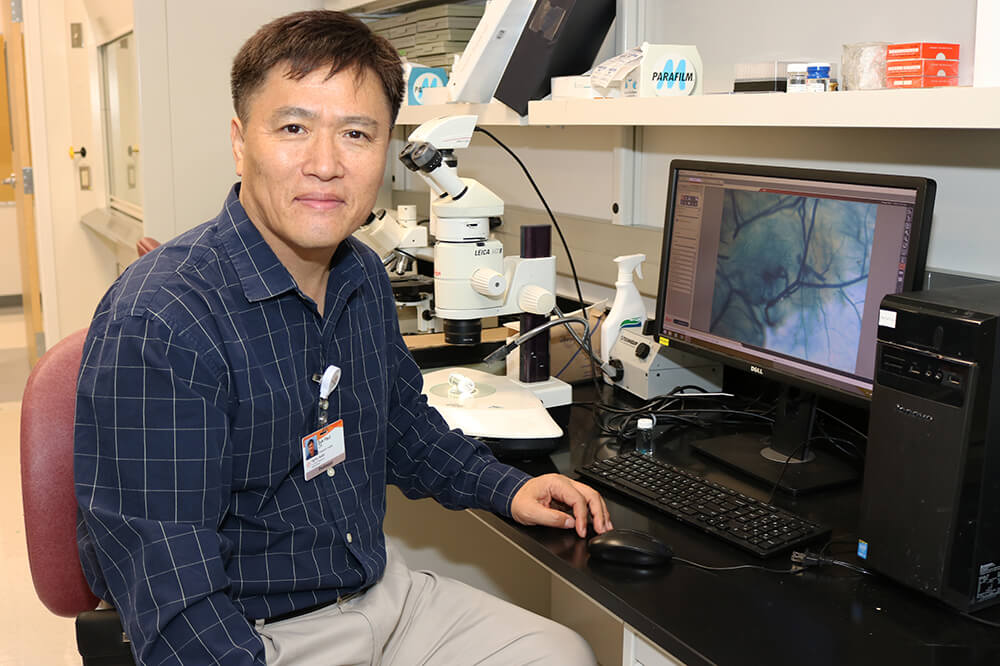These vascular deformities are caused by ENG, ALK1, or SMAD4 mutations in endothelial cells (ECs). Recently, we have suggested that ENG and ALK1 form a linear signaling pathway for the formation of the proper arteriovenous network during angiogenesis using mouse models. However, cellular signaling mediators and their effects attributing to AVM formation remain unclear. To identify the key intracellular signaling mediators and effectors in the vascular anomaly, we are exploring common signaling mediators associated with ENG/ALK1/SMAD4 using various interaction proteomics tools including BioID- or APEX-mediated proximity labeling and Co-IP ms/ms.
Devising reliable models to screen potential effectors responsible for the development of AVMs using iPSCs-derived ECs
Although HHT patients bear the heterozygous mutations in HHT-causing genes, recent next-generation sequencing data suggest that bi-allelic loss of ENG or ACVRL1 by somatic second mutation would be required for the development of AVMs in HHT. There is paucity of reliable genetically modified in vitro models to study AVMs, so we recently established ALK1- or ENG-knockout iPSCs and stable EC-differentiation protocols in order to determine the real key molecules and signaling involved in HHT pathogenesis.
Now we are focusing on:
- Identifying potential therapeutic targets using transcriptomics (RNA-seq)
- Devising in-vitro/ex-vivo model systems to investigate whether the candidates are responsible for development of AVMs using iPSCs-derived ECs
Delineating the Pathogenic Processes of AVMs using Real-time Hyperspectral Imaging System
Although we have demonstrated that environmental second hits such as wounding or angiogenic stimulation are required for AVM development in the brain and subdermal blood vessels in addition to genetic predisposition of HHT-causing genes in adults, the mechanisms how the stimulations are involved in the development of AVMs are still unclear.
Using real-time hyperspectral imaging system on dorsal skin window chamber and fluorescence-labelled RBC tracing techniques, we have been determining whether AVMs are caused by the dilation of existing vessels or if the malformation of nascent blood vessels results in dilated and tortuous AV fistulas.
Determination of the Physiological Ligands and Type II Receptors for ALK1-ENG Pathway Pertinent to HHT Pathogenesis
An AVM is primarily caused by a loss-of-function mutation in HHT gene, ENG, ALK1, or SMAD4. ENG and ALK1 function together with a type II receptor in TGF-b conserved signaling mechanism following the binding of ALK1 ligands. Understanding the upstream components of ENG-ALK1 signaling is crucial for unveiling the mechanisms of HHT. We are aiming to determine the physiological ligand and type II receptor(s) for ENG-ALK1 signaling pathway for the proper formation of arteriovenous network during angiogenesis, and thus their deficiency underlies HHT utilizing inducible mouse models.
Furthermore, we aim to determine whether and how genetic and molecular factors modify collateral density and vascular adaptation in AVM formation utilizing genetically engineered mouse models with collateral artery-regulating genes.
The development of longitudinal preclinical mouse models is critical to develop therapeutic interventions for the regression of brain AVMs. Using Taglncre(+);ALK12f/2f transgenic mice, we study the changes in brain AVMs over time via magnetic resonance angiography (MRA). We found that approximately 40% of transgenic mice exhibit stable brain AVMs that replicate nidal anatomy, arteriovenous hemodynamics, and microhemorrhaging. Furthermore, we are testing two potential drug candidates to regress AVMs.
Development of Preclinical Mouse Models for Sporadic Brain AVMs
Recently, it was reported that 50% of human sporadic brain AVMs are associated with somatic activating mutations of the KRAS gene. The major cell type carrying this mutation were vascular endothelial cells (ECs) in the brain. We are utilizing a transgenic mouse model in which mutant KRAS protein is expressed in vascular endothelial cells when doxycycline is given (Dox-on). We have found that expression of mutant KRAS protein can induce the development of AVMs in the brain and wounded skin. However, the severity of brain AVMs in this model appeared to be mild and the frequency was low.
This result could be in part due to ineffective induction of mutant KRAS protein by Dox. As complementary and alternative approaches, we are utilizing two additional mouse models: conditional Kras knock-in mice that are designed to express mutant KRAS protein when tamoxifen is administered and a Kras ‘Dox-off’ model in which mutant KRAS protein is constitutively expressed in ECs but stops when Dox is given. With these models, we are investigating the critical stage of mutant KRAS expression for brain AVM development and the role of mutant KRAS proteins for the maintenance of AVMs.
Localized Conditional Induction of Brain AVMs in Transgenic Mice
Current brain AVM mouse models are limited by early mortality due to gastrointestinal inflammation and hemorrhaging. The brain AVMs lack uniformity and require time-consuming location identification and dysplasia index quantification. Using stereotactic injection of hydroxytamoxifen in transgenic mice, we aim to induce cerebral AVMs in a time- and location-specific manner, allowing us to reliably reproduce brain AVMs in various sizes and locations. This will enable us to rapidly screen for new therapies and further investigate AVM pathogenesis.









